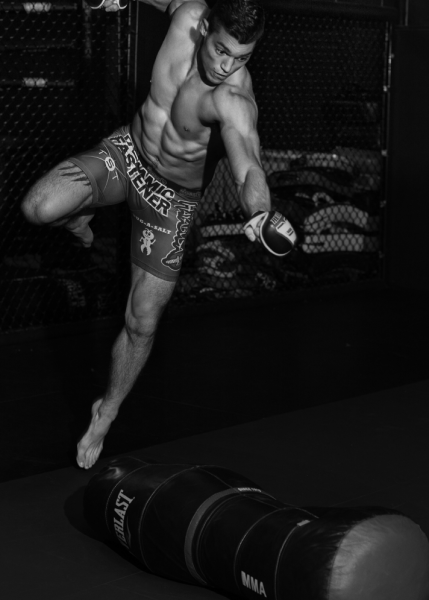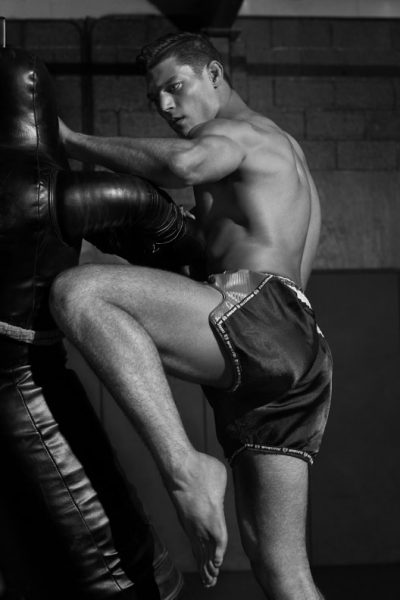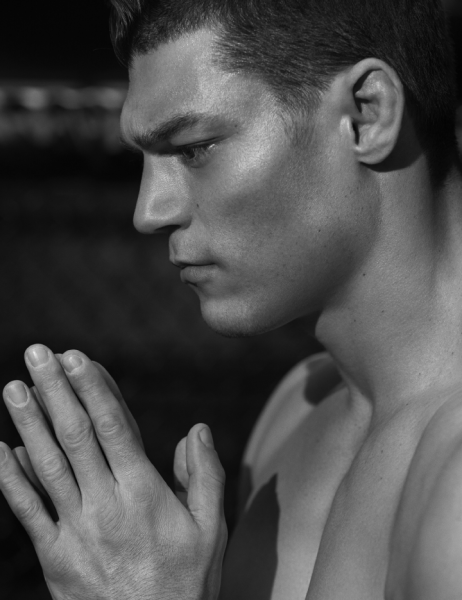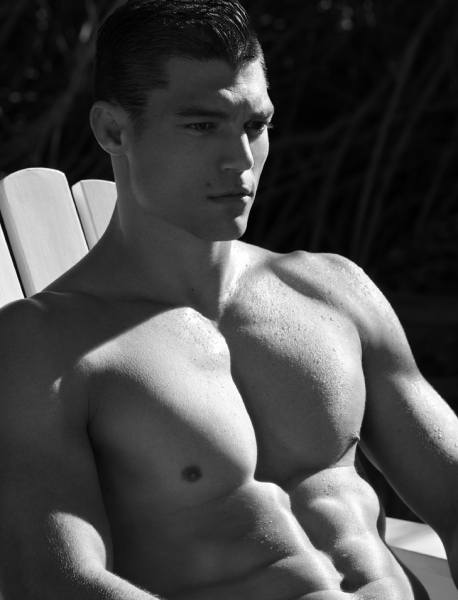BLACK EYE BLOODY NOSE AND FAT LIP
COURTESY OF
ALAN JOUBAN

S
tanding six feet tall, with a strong chin, intelligent wide-set eyes and the easy approach of a southern boy, Ultimate Fighting Championship welterweight Alan Jouban doesn’t look like a typical fighter. But from an early age, growing up in Lafayette, Louisiana, just south of his grandfather’s ranch and the bulls from which Alan got the nickname Brahma, it was clear what he was born to do.
“Anyone who knew me from Louisiana would say, ‘I remember him. He was always getting into fights,’” says Alan, wrapping his hands before a training session at Black House MMA, an all-black-everything fight factory just outside of Los Angeles. “Growing up, I had a punching bag in my garage. In there I’d listen to the Rocky sound track over and over again. I’d watch Bloodsport. I bought a couple pairs of gloves and had guys over to my house after school for backyard boxing. I didn’t have any training then. I just liked to fight. And you could always find someone else who liked it, too.”
If you were looking, you could always find a fight in Alan’s hometown. Lafayette is a college city, breeding grounds for quick competition. “I’m born a fighter,” Alan explains. “I just never knew it was something I could do professionally.” He’s not proud of his street-fighting past—anymore—and yet Alan’s story, from backyard boxer to member of an elite collection of professional athletes, begins with a bar-room brawl when he was seventeen. “An older, bigger guy started talking trash. I sucked it up and said, You know what, I’m going to make a name for myself. We went outside. I laid a big left hand on the guy and dropped him.” In school the next day, Alan got a reception. “Everybody was talking about it. I can still remember that feeling: seeing fear in someone else, hitting a bigger, more experienced guy, and then everybody giving me that love. It changed something in me.”

Boys are taught that aggression is good, as long as it’s called competition, and that violence is bad, unless someone’s keeping score. Fighting is discouraged, if not outlawed. In any case, it’s not an option for kids. There’s nothing tantamount to the football field for boys born fighters.
taking a beating and then coming back from it, showing heart and inspiring people—i’ve always wanted to be that guy
For Alan, growing up in the nineties, mixed martial arts was nascent, paid minor purses and was regarded by the general public, as John McCain famously put it, as human cockfighting. “I watched the UFC religiously, but at the time it wasn’t a real option. Actually, I was always anxious to discover what I was going to be in life because then I could try to be the best at it,” Alan says. “I didn’t want to be average at something. Even if it was selling cars, I just wanted to know. And I’d kill it.”

Meanwhile, Alan went to college at the University of Louisiana and waited for life to give him options. When it did, in the form of a modeling contract, he left school and moved to New York. He made the rounds: castings, waiting for his phone to ring, and hoping for a call back. “The thing about modeling that bothered me—as mind opening as it was with all the traveling and great people I met—I knew it wasn’t what I was meant to be. Whether I got work depended on someone’s opinion of me.”
In New York, months turned into years and Alan never stepped foot inside a gym. It wasn’t until he moved to Los Angeles that he started training in a Muay Thai academy, the Bomb Squad. “That’s when I remembered that fire in me.”
Alan’s first bouts weren’t exactly legal. “Gyms can’t afford to shell out money for the state commission to sanction Muay Thai matches, and to pay for refs and judges,” Alan explains. “So they keep it behind closed doors.” It’s called a smoker. Guys show up from local academies. A hundred people pay ten bucks at the door. Novice fighters get a little experience. “At first I just watched. As many as possible. After three months I had my first match. I was hooked.”
Pummeling by night and posing by day worried his clients. “I had to cover the bruises on my shins, hide my red ears. I had black eyes a lot of the time. I was hesitant to cross that line and to try to go pro. At that point modeling paid the bills. Fighting was a hobby. I hadn’t even begun training Brazilian jiujitsu,” a cornerstone of mixed martial arts. “The only time I’d worn a gi was on Halloween. If anything, I thought I’d stick to striking and maybe, if I got good enough, I’d go pro in Muay Thai.”
That’s when I remembered
that fire in me
In 2009, Alan booked his first pro Muay Thai fight in Thailand. But two days before the show he got food poisoning and wound up in a hospital hooked to an IV. “I left the hospital the morning of the fight. When I showed up I didn’t see my face on the fight poster.”
With Alan away sick, the promoter forgot to find him an opponent. When Alan confronted him, “he started looking for guys to fight me on the spot. He found this 150-pound Thai guy who had two hundred matches under his belt. I told him, ‘No, he’s got too much experience.’ Then he brings me the guy’s fat brother. And I said, ‘I’m not gonna fight him either. I’ll look like an American bully picking easy matches.’ He kept throwing random guys at me. I had a gut feeling it was the wrong night.” He returned to America, an amateur still, but determined.
From weeks in Muay Thai camps training with lethal strikers, Alan found his confidence, and his aggression, boosted. Just days after coming home he busted his knuckle on a Hollywood corner. While he avoided punching in order to rehab his bone, he began training at Eddie Bravo’s 10th Planet Jiu Jitsu. “Once I had a decent Brazilian jiujitsu base I decided to do five amateur mixed martial arts fights in one year. I asked my coach, ‘If I win them all, can I turn pro?’ And he said yes.”
Hand healed, Alan’s first amateur MMA fight was scheduled. He won by knockout in fourteen seconds—another big left. “It’s like I found who I was. I finally knew what I was supposed to do with my life.” He had four more fights to complete, trained hard, and won. Finally, Alan was going pro.
In fight camp life is a strict routine: grueling twice-a-day training sessions, positional drills, weight lifting, sparring, eating wholesome meals, studying opponents’ fight reels, cutting weight, and getting recovery sleep—if possible. “I’ve never been a great sleeper, but as a fight comes up it can affect it more. I think about getting my nose busted, my eye cut open, or getting knocked out. The eight-week training camps are the hard work. Fights are just a few rounds.” Less in the case of Alan’s professional MMA debut. When his opponent shot in, Alan threw a knee and the lights went out. This time the fight lasted fifteen seconds.

“I went ballistic,” Alan recalls. “I remember celebrating with my brother afterward and saying, ‘I’m a professional athlete. Not only that, but I’m a professional fighter! Who would’ve thought I’d make it?’” Alan continued to rise through the ranks, eventually becoming the Fight Club OC welterweight champion. Last year he signed with the UFC, the major leagues of MMA. And, in what has become an Alan Jouban debut trademark, he won his first UFC bout by knockout in the first round. It was a short, vicious battle that earned Fight of the Night honors.
Alan’s transformation into a fully formed fighter is measured by his flesh in bruises, knots, and scars, and recorded in a tattoo: “Keep your fears to yourself – Share your courage with the world.” “When I’m locked in a cage I know who I am. Taking a beating and then coming back from it, showing heart and inspiring people—I’ve always wanted to be that guy,” Alan says. “It’s like Bloodsport and the Rocky movies I loved as a kid.”